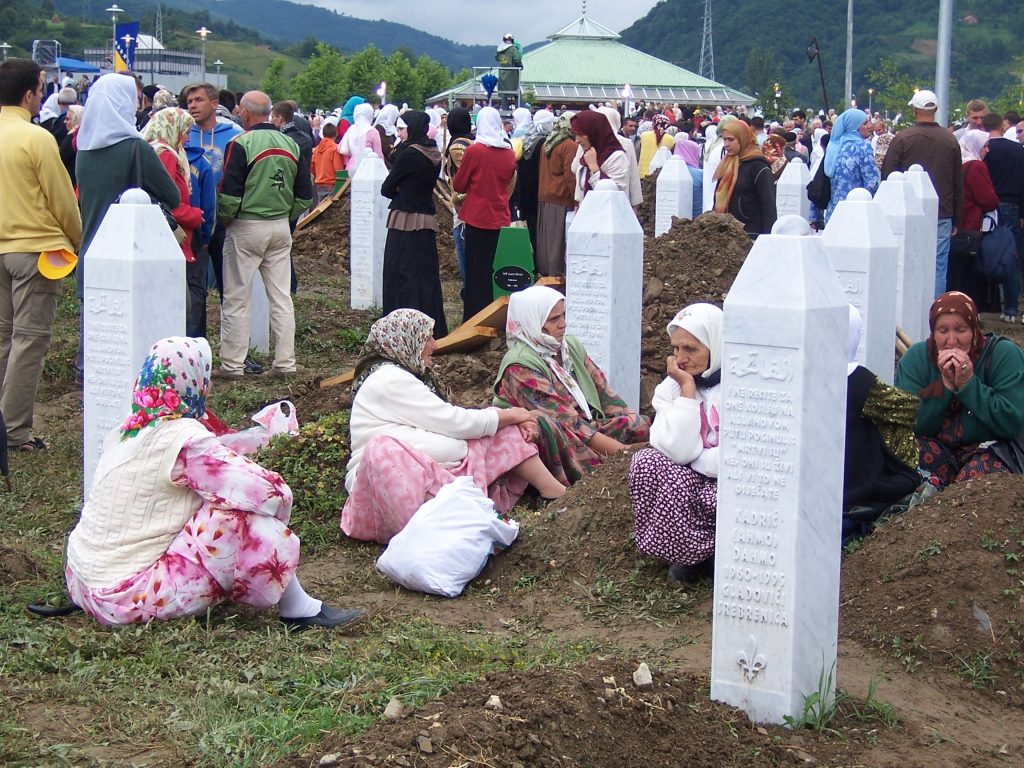Reflections on the importance of the newest addition to UConn's ICTY Digital Archives, the Srebrenica Genocide Archives Collection.
Justice, truth, and memory lie at the heart of what it means for a society to rebuild after suffering from genocide and mass atrocity. Justice that holds perpetrators accountable and attempts to repair the harm that was done to victims and their communities. Truth that establishes the facts of what occurred. Memory that is a faithful reflection of that truth. These are the tools we use to stabilize, heal, and rehabilitate a post-atrocity society. All require the courage to deal with, rather than ignore, a past legacy of massive human rights abuses.
Achieving justice, truth, and memory does not happen quickly or come easily. To deal with the past is to open a wound that may be more comfortably, at least in the short term, left ignored. Long term, however, to let the wound fester is to invite the recurrence of another, perhaps even more grievous, conflict-laden future.
This is precisely why UConn's internationally recognized International Criminal Tribunal for the Former Yugoslavia (ICTY) Digital Archives are such a rich and important resource. Established by the United Nations in 1993, the ICTY was the first international war crimes court of its kind since Nuremberg, and it focused extensively on investigating the atrocities committed during the Yugoslav Wars of 1992-95. The ICTY Digital Archives - the result of an ongoing collaboration between Dodd Human Rights Impact Programs, the UConn Libraries, the Connecticut Digital Archive, and individual scholars, witnesses, and others involved in the tribunal - seek to make the work of the tribunal accessible to researchers, educators, students, and others.
Under the leadership of Predrag Dojčinović, who formerly worked for the Office of the Prosecutor at the ICTY, and Aida Gradaščević, a graduate of UConn's master's program in human rights, a team of UConn student researchers have helped curate ten unique and diverse collections related to documents, translations, photographs, expert reports, records, and other materials from the ICTY.
For Dojčinović, the ICTY Digital Archive "stands as a powerful and enduring monument to justice, truth, and remembrance, a meticulously curated legacy uniting victims' voices, expert insights, and judicial records into an unassailable historical testament. By opening this profound repository to the world, we affirm that justice transcends the courtroom: it lives in public memory, breathes through open dialogue, and endures in our shared commitment to truth, accountability, and reconciliation."

The newest addition to UConn's ICTY Digital Archives, the Srebrenica Genocide Archives Collection, is particularly timely as July 2025 marks 30 years since the genocide in Srebrenica occurred. Standing as the gravest crime committed on European soil since the Second World War, over 8,000 Bosniak (Bosnian Muslims) men and boys, despite the presence of United Nations peacekeepers, were systematically murdered by Bosnian Serb forces in July 1995. The bodies of the victims - three generations of males, including some as young as 10 years of age - were then dumped into mass graves or thrown into the Drina River. To conceal the extent of the massacre, Bosnian Serbs later scattered the remains of many of the victims in secondary or tertiary mass graves. To date, the remains of nearly 1,000 of the Srebrenica victims have yet to be found.
Alongside official court materials, the Srebrenica Genocide Archives Collection includes a wider range of sources: scholarly articles, books, films, podcasts, images, and other media that continue to tell the story of Srebrenica and trace its enduring impact three decades later. The collection is designed to evolve over time, growing through continued research and contributions to ensure that the memory of Srebrenica remains active, accessible, and instructive for generations to come. This collection is particularly crucial as denial of the Srebrenica genocide, along with glorification of convicted war criminals, remains painfully prevalent in Serb political and social discourse throughout the region.
In reflecting on the events he survived in the former Yugoslavia, the late poet Goran Simic captured the importance of projects like the ICTY Digital Archives: "Dealing with the past will not be easy, but it is essential. Dealing with our own past by bringing closure and offering justice for all, perpetrators and victims, is the only right way. This path will not remove crimes from history. It will not repair souls that have been torn apart. But it will offer them the option to move on, and future generations will be able to live without the baggage of what went before."
James Waller, Professor of Literatures, Cultures, and Languages & Dodd Chair in Human Rights Practice at the Gladstein Family Human Rights Institute, UConn






